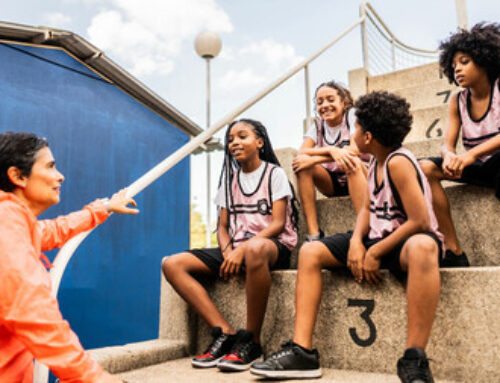A 9-year-old girl, whom I had been coaching for two years in gymnastics, came to our athletics club for the first time last summer. She was wearing lumpy, heavy shoes and was struggling to keep up in our short races. I was surprised because in gymnastics she is very fast and springy. She said she never did well in school PE or on sports day. I suggested she ran barefoot: she promptly won the next race. She jumped up and down and was cheering as if she had won the Olympics. I shook my head and told her, ‘that’s not how we behave here.’
Winning gracefully is as essential as losing gracefully. The next race or event could be the one where you get your butt kicked: how will it make you feel?
In our athletics sessions, we never have a dominant winner in all categories. Everyone is good at different things. Every child is the best at one particular aspect: the 100-meter sprint or the long jump, but it could also be one of the technical drills.
Self Confidence
Praising the slower child for being the best at mini-hurdles builds up their confidence and shows recognition of their effort. This also shows other athletes that every person in the group has something to offer. It shows that winning takes many different forms and allows the everyday ‘winners’ to feel the pain and ignominy of losing.
It is then an easy step for a coach to say, ‘Remember how you felt when you didn’t win that drill?’ and explain to the athlete how to treat others in the same situation.
The early-developer who is the fastest runner may have a ‘false’ self-confidence and sense of superiority because they are easily winning all the races in your club. This can lead to lazy training habits and a potentially egotistical attitude that catches up with them when the competition gets tougher: they go to a regional meet. They suddenly find that all the other sprinters are just as fast or faster.
Winning Habits Start At Practice
Good winning habits and respect start in the training sessions: the fast need to be put under pressure—the slow need to be encouraged or given opportunities to win. The coach can then praise the effort of everyone and also those who encourage each other. Team culture is built this way, even in individual sports, and the athletes encourage each other. This is common in boxing gyms and martial arts dojos: the champions need sparring partners and encourage them. Respecting the rest of the participants, no matter what their level, is important for continued success. The bravado of the pre-match boxing press conference is designed to increase TV ratings. It does not reflect reality. Boxers who step into the ring always respect their opponents. After almost every bout, the winner will credit their opponent for their grit and determination.
No matter what star player a team has, one person doesn’t make the win. A winner stays humble, knowing that it always takes the entire team, no matter who scores all the points.
Teaching Empathy and Respect
Empathy is an excellent trait to have for all sportspeople. My son’s football team lost 11-3 against a better team. He could take that. But there were several athletes on the other team who were jumping up and down. They were saying to their parents how easy it was and how they had trashed the other team. My son and his teammates had been trying their hardest but had met a better team. I used it as a lesson and said, ‘You know how you feel right now? Remember that, and don’t behave like a gloating winner. No matter how lopsided the score is, the other team deserves respect for giving their all and not giving up. That takes guts!
Recognize Mistakes
Winning doesn’t necessarily mean that everyone performed flawlessly. Knowing that an athlete hasn’t achieved perfection and has a long way to go is essential if they want to continue growing. Rejoice in the win, yes; then pick apart the game to learn how to continue to improve.
Choosing Role Models
Roger Federer has won 103 tennis titles, including 20 Grand Slams. He is never anything but gracious after every match, shaking hands and congratulating his opponent. Yet, he does everything in his power to win the match. He and his unfortunate opponent know who the better player is, but Federer never taunts or trash talks. His play does the talking for him.
Coaches can use examples of players like Federer to show their athletes how to behave.
It is great to win a tough sporting event. There is every reason to feel proud and to enjoy the moment. But that does not mean posting a gloating message on social media. Winning like a champion is only an individual effort in the actual race. Preparing for that victory requires good coaching and good training partners, and someone to compete against. Trash-talking the opposition and gloating will soon mean that teams don’t want to play you. Not because they are beaten, but because of how they feel afterward.
To win like a champion, you have to become accustomed to winning and behaving like a champion. Success breeds success and courtesy leads to courtesy. This is something that can be developed in coaching sessions and reinforced by parents and teammates.
RECOMMENDED FOR YOU
A 9-year-old girl, whom I had been coaching for two years in gymnastics, came to our athletics club for the first time last summer. She was wearing lumpy, heavy shoes and was struggling to keep up in our short races. I was surprised because in gymnastics she is very fast and springy. She said she never did well in school PE or on sports day. I suggested she ran barefoot: she promptly won the next race. She jumped up and down and was cheering as if she had won the Olympics. I shook my head and told her, ‘that’s not how we behave here.’
Winning gracefully is as essential as losing gracefully. The next race or event could be the one where you get your butt kicked: how will it make you feel?
In our athletics sessions, we never have a dominant winner in all categories. Everyone is good at different things. Every child is the best at one particular aspect: the 100-meter sprint or the long jump, but it could also be one of the technical drills.
Self Confidence
Praising the slower child for being the best at mini-hurdles builds up their confidence and shows recognition of their effort. This also shows other athletes that every person in the group has something to offer. It shows that winning takes many different forms and allows the everyday ‘winners’ to feel the pain and ignominy of losing.
It is then an easy step for a coach to say, ‘Remember how you felt when you didn’t win that drill?’ and explain to the athlete how to treat others in the same situation.
The early-developer who is the fastest runner may have a ‘false’ self-confidence and sense of superiority because they are easily winning all the races in your club. This can lead to lazy training habits and a potentially egotistical attitude that catches up with them when the competition gets tougher: they go to a regional meet. They suddenly find that all the other sprinters are just as fast or faster.
Winning Habits Start At Practice
Good winning habits and respect start in the training sessions: the fast need to be put under pressure—the slow need to be encouraged or given opportunities to win. The coach can then praise the effort of everyone and also those who encourage each other. Team culture is built this way, even in individual sports, and the athletes encourage each other. This is common in boxing gyms and martial arts dojos: the champions need sparring partners and encourage them. Respecting the rest of the participants, no matter what their level, is important for continued success. The bravado of the pre-match boxing press conference is designed to increase TV ratings. It does not reflect reality. Boxers who step into the ring always respect their opponents. After almost every bout, the winner will credit their opponent for their grit and determination.
No matter what star player a team has, one person doesn’t make the win. A winner stays humble, knowing that it always takes the entire team, no matter who scores all the points.
Teaching Empathy and Respect
Empathy is an excellent trait to have for all sportspeople. My son’s football team lost 11-3 against a better team. He could take that. But there were several athletes on the other team who were jumping up and down. They were saying to their parents how easy it was and how they had trashed the other team. My son and his teammates had been trying their hardest but had met a better team. I used it as a lesson and said, ‘You know how you feel right now? Remember that, and don’t behave like a gloating winner. No matter how lopsided the score is, the other team deserves respect for giving their all and not giving up. That takes guts!
Recognize Mistakes
Winning doesn’t necessarily mean that everyone performed flawlessly. Knowing that an athlete hasn’t achieved perfection and has a long way to go is essential if they want to continue growing. Rejoice in the win, yes; then pick apart the game to learn how to continue to improve.
Choosing Role Models
Roger Federer has won 103 tennis titles, including 20 Grand Slams. He is never anything but gracious after every match, shaking hands and congratulating his opponent. Yet, he does everything in his power to win the match. He and his unfortunate opponent know who the better player is, but Federer never taunts or trash talks. His play does the talking for him.
Coaches can use examples of players like Federer to show their athletes how to behave.
It is great to win a tough sporting event. There is every reason to feel proud and to enjoy the moment. But that does not mean posting a gloating message on social media. Winning like a champion is only an individual effort in the actual race. Preparing for that victory requires good coaching and good training partners, and someone to compete against. Trash-talking the opposition and gloating will soon mean that teams don’t want to play you. Not because they are beaten, but because of how they feel afterward.
To win like a champion, you have to become accustomed to winning and behaving like a champion. Success breeds success and courtesy leads to courtesy. This is something that can be developed in coaching sessions and reinforced by parents and teammates.










